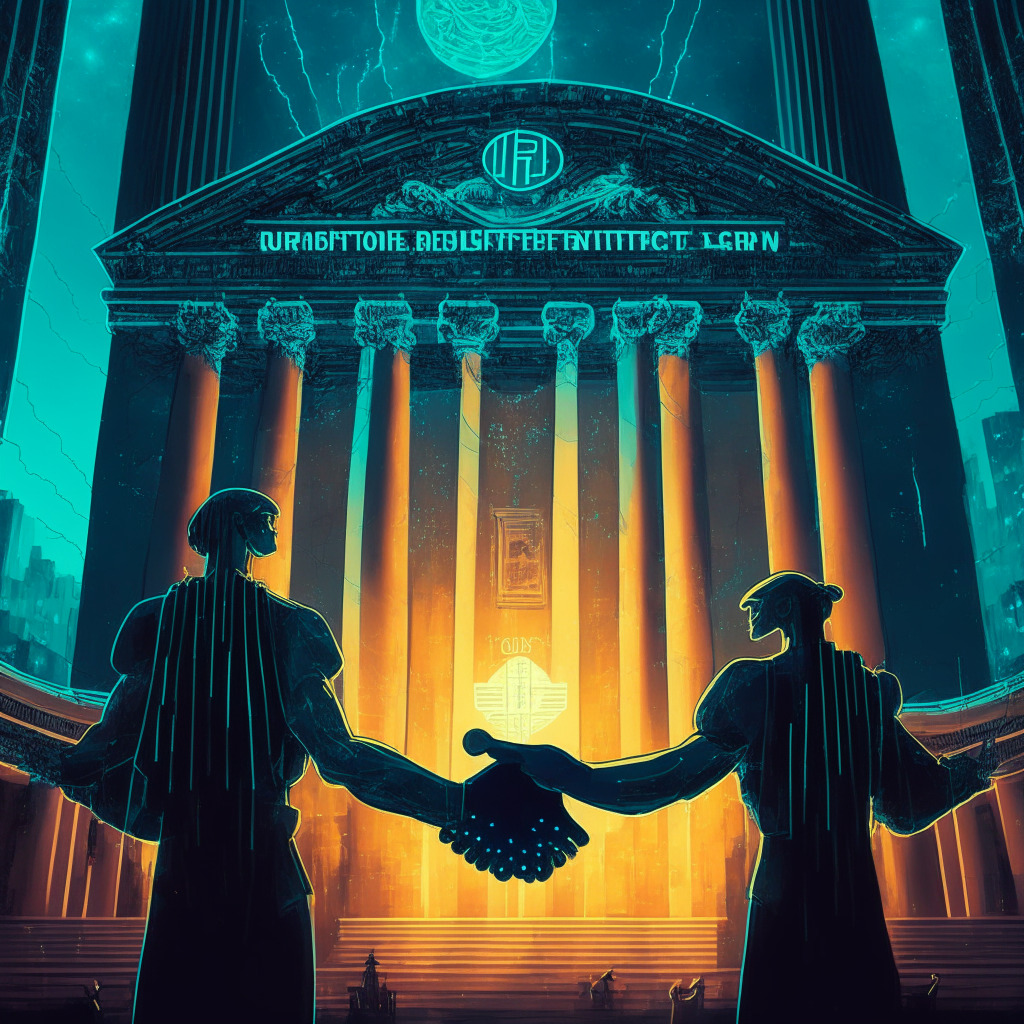“The revised Cambridge Bitcoin Electricity Consumption Index (CBECI) presents a more accurate estimate of Bitcoin’s power use by considering recent mining hardware developments. Changes reflect findings that older models are overrepresented, while newer, still-in-use equipment is underrepresented. The update also includes geographic distribution and greenhouse gas emissions related to Bitcoin mining.”
- Kennedy’s Bold Crypto Agenda: An Independent Run for Presidency Powered by Bitcoin
- OK Group’s Rebranding: Power Consolidation or Crypto Evolution?
- The Fall of FTX’s Sam Bankman-Fried: A Cautionary Tale or Web3 Symbol’s Downfall?
- Crucial Crypto Updates: The Bitcoin Slump, Crypto Aid Israel and The Rise of BitVM
- RFK Jr’s Pro-Crypto Presidential Run: Redefining America’s Financial Future and Political Landscape
- Unraveling Ripple’s Future: Implications of CFO’s Sudden Exit on Crypto Landscape
- Unveiling the Crypto Controversy: Accountability Amidst Progress, from Bankman-Fried to Future Prospects
- Blockchain Aid: A Lifeline in Humanitarian Crises or a Cybersecurity Challenge?
- Bitmain’s Struggle but Hive’s Triumph: A Tale of Two Bitcoin ASIC Companies
- Unraveling the AnubisDAO Saga: Accountability Challenges and Transparency Paradoxes in Crypto
Tamadoge Gearing Up for Major Marketing Drive: New Features, Hidden Projects and Potential Risks
“Tamadoge, a Web3 play-to-earn gaming platform, is all set for a significant marketing campaign. This includes promoting its new staking and burn features, securing top exchange listings, unveiling hidden projects and giveaways, and launching a huge crypto marketing campaign focusing on major influencers and a possible airdrop.”
Binance And its Formula 1 Collaboration: A High-Speed Chase Towards Mainstream Relevance & Regulatory Challenges
“Binance, in collaboration with racing driver Pierre Gasly, is hosting an art competition, where the winner’s design will feature on Gasly’s helmet during the 2023 Abu Dhabi Formula 1 Grand Prix. This initiative encourages creative engagement and community interaction among Binance users and F1 fans alike.”
Navigating the Transition from BUSD to FDUSD in the Crypto Market: Is It Worth the Risk?
“Binance confirmed plans to wind down support for Binance USD by 2024, promoting instead the First Digital USD. This decision follows a regulatory notice by the SEC to Paxos, alleging Binance USD as an unregistered security. The success of First Digital USD depends on its acceptance and adoption within the crypto community.”
Grayscale’s Bitcoin ETF Victory: Bolstering Future Approvals & Robinhood’s BTC Integration Impact
Grayscale Investments’ recent victory against the SEC regarding their Bitcoin ETF has stirred markets and increased the likelihood of approved Bitcoin ETFs. Despite slight retracement of Bitcoin’s price, the integration of Bitcoin into Robinhood’s wallet is softening the blow for the BTC/USD market.
Dismantling Binance USD: Unveiling Binance’s Plan to Cease Support for its Stablecoin by 2024
“Binance cryptocurrency exchange plans to remove eight Binance USD trading pairs from its platform, suggesting it could cease support for the stablecoin by 2024. This stems from allegations that the stablecoin’s issuer, Paxos, produced an unregistered security. Concurrently, competitor stablecoin Tether witnesses market growth.”
Bankruptcy Battle: Gemini and Genesis in a Clash over Resolution Prospects
“Crypto exchange Gemini is contesting Genesis’ proposed bankruptcy resolution, citing lack of specifics and unsatisfactory assurances for key creditors. Gemini, along with the Fair Deal Group and the Ad Hoc Group of Genesis Lenders, questions the plan’s clarity and comprehensiveness, highlighting Genesis’ unsettled debts and its capacity to execute a sustainable plan.”
Crypto Corruption Scandal in South Korea: An Intense Debate on Market Regulations
“South Korean prosecutors’ attempts to issue arrest warrants for a former golfer and the CEO of crypto exchange, Bithumb, on corruption allegations have reignited debates on crypto market regulations globally. These cases, attesting to potential corruption and manipulation within the industry, highlight the need for effective regulation in this rapidly evolving sector, while also raising concerns about impacting its growth and innovation.”
Second Chance for US Crypto Regulations: A Comparative Study of Global Trends
“The US digital asset industry may revive as courts counter the perceived hostility of the authorities. Digital asset lawyer, Jeremy McLaughlin, suggests recent cases weakening SEC’s argument might spark industry resurgence. However, he noted the challenges of such contentious landscape.”
Exploring Future Crypto Concepts and Pepe Token Resurgence: A Balancing Act
“Coinbase CEO, Brian Armstrong, outlined ten innovative crypto concepts for the future. Key areas include ‘flatcoin’, a decentralized stablecoin that can track inflation, ‘on-chain reputation’ and ‘on-chain ads’, and ‘on-chain capital formation’ for democratized fundraising. However, each concept comes with associated challenges that must be addressed for successful implementation.”
Worldcoin’s Rising Influence Amid Privacy Fears: A Tale of Economic Access and Data Ethics
Worldcoin, co-founded by Sam Altman, leverages iris scans for online identity verification, drawing both popularity and scrutiny. Despite ongoing data privacy investigations, their novel approach has attracted about 2.2 million people globally since late 2021. However, potential misuse of biometric data raises security concerns.
Ramaswamy’s Support and Regulatory Challenges: Unraveling the Future of Cryptocurrency in the US
“U.S. Presidential candidate Vivek Ramaswamy praised Grayscale’s victory over the federal securities regulator, asserting it could further Bitcoin and blockchain innovation. However, the legal landscape for cryptocurrency regulation remains complex and uncertain, despite support from industry influencers and active discussions for clear regulations.”
Exploring the Forces Shaping Bitcoin’s Spiraling Rise Above $27,000: A Market, Technical, and Global Outlook
“Bitcoin (BTC) has surged above $27,000, a jump many credit to Grayscale’s recent legal victory to turn its Bitcoin Trust into an ETF. Global cryptocurrency market capital grew roughly $50 billion in a day, raising hopes for future growth. Factors such as increasing acceptance of crypto by countries like Netherlands and endorsements by US figures further strengthen the market’s legitimacy.”
Fostering Global CBDC Adoption: China’s Dynamic Push at the Asian Games
“China is pushing for digital yuan adoption at the upcoming Asian Games. This event aims to showcase the central bank digital currency (CBDC) on an international platform. Attendees within pilot zones can buy tickets using the official CBDC app, marking a first for major sports events in China. This initiative is seen as a potential accelerator for broader digital currency adoption.”
Crypto Commodities: Bitcoin and Ether and their Legal Status in US Courts
U.S. District Court Judge Katherine Polk Failla recently referred to Ether and Bitcoin as “crypto commodities,” dismissing a lawsuit against decentralized exchange Uniswap. The legal classifications of cryptocurrencies continue to vary, with other digital currencies such as XRP classified as a security. Amidst conflicting views, U.S. lawmakers are yet to determine whether SEC or the CFTC will have authority over digital assets. Specialists suggest these legal classifications are crucial for creating a more organized and regulated crypto environment.
Predicting Bitcoin ETF Approval: A Blockchain Game Changer or Regulatory Roadblock in 2023?
“The year 2023 could be a pivotal one for Bitcoin Exchange-Traded Funds, with a 75% likelihood of approval, according to Bloomberg analysts. This optimism results from Grayscale’s legal triumph against the U.S. Securities and Exchange Commission, affecting the future of Bitcoin ETFs and crypto adoption.”
Genesis Bankruptcy Woes: Gemini’s Doubts and DCG’s Debts Cloud Crypto Markets
The Fair Deal Group and Gemini express skepticism over Genesis’s proposed bankruptcy resolution, citing lack of substantial details and concerns about the company’s ability to implement a feasible plan. The situation calls for greater transparency and stronger financial practices within the crypto markets.
Unmasking the Truth: Decreased Bitcoin Deposits on Exchanges & Future Market Predictions
Bitcoin’s recent departures from centralized exchanges could suggest a bullish outlook or indicate trust in custody solutions. However, SEC regulatory actions, declining buyer interest, and lower daily volumes suggest traders may be reluctant to actively trade the asset.
Ripple Effects of Grayscale’s Court Win: Impact on Cryptocurrency Market & U.S. Spot Bitcoin ETF Future
Grayscale’s recent legal victory against the U.S. Securities and Exchange Commission may potentially transform the company into the first-ever U.S. spot Bitcoin ETF. This development could make Alameda Research’s lawsuit against Grayscale, urging for lower fees and a redemption program, unwarranted. However, the lawsuit has brought the debate on fee structures and redemption policies into the spotlight, which could ultimately shape the future of blockchainization.
Market Shivers: Cryptocurrencies Navigate Bearish Waters amid Grayscale Legal Tiff
Bitcoin’s recent dip to $27,240 and Ether’s slight decrease reflects uncertainty following Grayscale’s court victory against the SEC. The court order for SEC to reconsider its rejection of Grayscale’s transformation of GBTC into a spot bitcoin ETF could be a catalyst towards a future for BTC ETFs. Nevertheless, caution is suggested due to potential further downside for Bitcoin if it doesn’t overcome the $28,000 level.
Harnessing Web3 Technologies to Conquer Deforestation Compliance: A New Dawn or a Daunting Challenge?
“Web3 technologies, traditionally used for cryptocurrencies, are being repurposed to tackle deforestation, a major environmental concern. By creating a unique digital fingerprint for each commodity on a blockchain system, commodities can be traced back to their origin, proving any links to deforestation and thus promoting responsible consumption and sustainable practices.”
The Grayscale Effect: Cryptocurrency Market Response and Forecast Uncertainty
“Cryptocurrency markets temporarily reenergized after Grayscale’s lawsuit victory against the US Securities and Exchange Commission, yet struggled to sustain gains. Traders seem focused on crypto-specific news, neglecting broader financial trends, indicating the crypto market’s high volatility. Despite the uncertainty, crypto-enthusiasts remain hopeful and persistent in their investment strategies.”
StarkWare’s Starknet Blockchain Upgrade: The Technological Paradox in Crypto Sphere
StarkWare, the force behind Starknet blockchain, plans to restore accessibility of digital currency for users, following outcry over wallets turning empty after a major tech upgrade. Those who didn’t timely upgrade their Argent or Braavos wallets experienced the issue. Starkware underlined paradoxes of tech advancements in the crypto sphere, balancing benefits against potential user frustrations.
Bitcoin’s Resilience Amid Market Doubts: A Closer Look at BEPE, EMERSO, and XPEPE
Bitcoin’s recent surge over $28,000, boosted by a favourable court decision for Grayscale, has stirred mixed sentiments in the market. Analysts relate Bitcoin’s trajectory to previous patterns and question the sustainability of the surge, particularly given low spot market volumes. Meanwhile, new cryptocurrencies like BEPE and EMERSO show volatility, with impressive gains and subsequent adjustments. However, investing in crypto always carries high risk.
Navigating MiCA: The EU’s Attempt at Blockchain Regulation and Its Impact on Crypto
The MiCA guidelines in the EU propose stricter regulations for crypto service providers and clampdown on market manipulation. However, they lack consideration for decentralized finance and central bank digital currencies. Moreover, they enforce a low reporting threshold eroding privacy rights, and require official approval for launching tokens, potentially inhibiting the development of new projects.
SEC’s Crypto Regulation Approach: A Stepping Stone or Stumbling Block?
Gary Gensler, the SEC Chairman, is facing criticism from lawmakers for his aggressive stance on crypto regulation lacking transparency. The SEC’s focus on enforcement and penalties, absent clear guidelines on crypto assets within its jurisdiction, has come under scrutiny. Furthermore, differing views on regulatory approach, particularly regarding potential links between Prometheum and Chinese entities, have led to questioning of the SEC’s approval procedures. As Gensler prepares to return to Capitol Hill, debates on cryptocurrency policy will intensify, with calls for a cohesive, clear, routine for regulating this sector.
Navigating Legal Hurdles: Former FTX CEO’s Trial and FTX’s Data Breach Debacle
Former FTX CEO Sam Bankman-Fried’s lawyers may request trial postponement due to alleged issues with access to discovery materials. He faces 12 criminal charges. Meanwhile, there’s been a breach involving a bankruptcy claim by FTX that potentially exposed user data, underlining inherent risks in the crypto arena.
Navigating the Regulatory Landscape: The Evolving Future of NFT Transactions
“The SEC has raised concern over NFT sales and transactions, alleging a company raised $30 million through unregistered NFT transactions. Despite some legal setbacks, proponents view such activities as signs of industry maturation, with corrective measures fostering increased trust in the marketplace.”
Legal Fairness vs. Technological Demands: Insights from a Crypto CEO’s Confinement
The former FTX CEO, Sam Bankman-Fried, has found himself in legal troubles again. His defense team claims that limited internet access and subpar laptop technology at the detention center are impeding their preparation for the upcoming trial in October.
Unveiling the Dark Side: How FTX’s Data Breach Exposes Crypto Vulnerabilities
“A cybersecurity breach at Kroll, a bankruptcy claims agent for cryptocurrency platform FTX, resulted in a leak of users’ sensitive data, contrary to earlier reports. This incident highlights the unresolved issues of user data protection in the crypto industry, raising questions about the future of blockchain technology and its mainstream market readiness.”
Crypto Updates: The Volatility of Friend.tech, Growing Pains of Shibarium, and Perils of DeFi Platforms
“The crypto market remains a blend of promise, innovation and uncertainty. Understanding the nuances of the technology and markets is vital for investors. Emerging trends and regulatory scrutiny constantly shape exchanges like Binance, while projects like Shibarium highlight the potential volatility of platforms.”
Uniswap Lawsuit Dismissal: Revealing DeFi Regulation Challenges & Solutions
A recent court dismissal of a class action lawsuit against Uniswap has prompted further discussions on cryptocurrency regulation. The ruling highlights the complex nature of DeFi platforms, emphasizing that software creators cannot be held liable for third-party misuse. The judgment underscores the importance of regulating entities in the tech-driven financial world, without stifling innovation through over-regulation.































